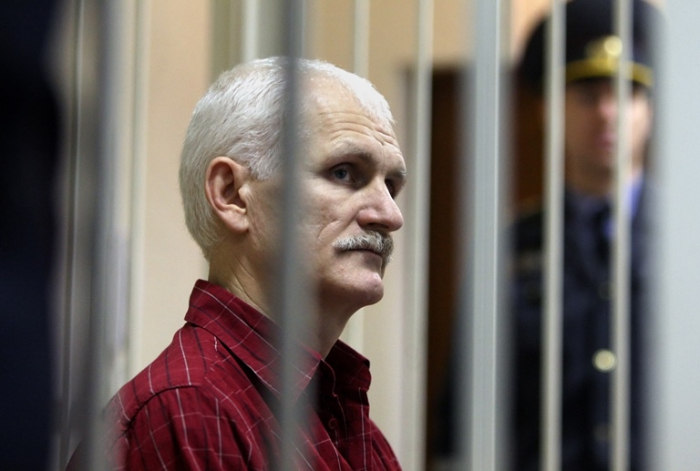A court in Belarus has sentenced Nobel Peace Prize winner Ales Bialiatski to 10 years in prison.
He was convicted of smuggling and financing "actions grossly violating public order", the Viasna human rights group said.
Supporters of Mr Bialiatski, 60, say the authoritarian regime of Belarusian leader Alexander Lukashenko is trying to silence him.
Mr Bialiatski was one of three winners of the 2022 Nobel Peace Prize.
He was arrested in 2021 following massive street protests over widely disputed elections the previous year, and accused of smuggling cash into Belarus to fund opposition activity.
Demonstrators were met with police brutality and Lukashenko critics were regularly arrested and jailed during the demonstrations, which started in 2020.
Mr Bialiatski was in court alongside two fellow campaigners, Valentin Stefanovich and Vladimir Labkovich.
Mr Stefanovich was sentenced to nine years in prison, while Mr Labkovich received seven years, according to Viasna, the group Mr Bialiatski founded in 1996.
All three had pleaded not guilty.
Mr Bialiatski's wife, Natalya Pinchuk, said the trial was "obviously against human rights defenders for their human rights work", describing it as a "cruel" verdict.
Referring to her husband's letters from prison, where he has been held since arrest, she said: "He always writes that everything is fine. He doesn't complain about his health - he tries not to upset me."
Kostya Staradubets, a spokesperson for Viasna, said the sentences imposed on the three activists were "breaking our hearts".
Speaking to the BBC World Service's Newshour programme, he said: "We knew that our three colleagues would get long prison terms but anyway it's still a shock, it's breaking our hearts, not only the [prison] terms are long but the conditions also very horrific.
"We call [the conditions] torture actually because they're being held for several months in a 19th Century building, poorly lit cells with no fresh air, no sunlight, poor food, little or no healthcare."
Belarus's exiled opposition leader Svetlana Tikhanovskaya said the sentencing was "simply appalling".
"We must do everything to fight against this shameful injustice and free them," she said.
Berit Reiss-Andersen, chair of the Norwegian Nobel Committee that awards the Nobel Peace Prize, said the verdict was a "tragedy" for Mr Bialiatski and described the charges as "politically motivated".
European Union foreign policy chief Josep Borrell condemned what he described as "sham trials", adding they were "yet another appalling example of the Lukashenko regime trying to silence those who stand up in defence of human rights and fundamental freedoms of the people in Belarus".
There are currently 1,458 political prisoners in Belarus, according to Viasna. Authorities claim there are none.
In awarding the 2022 Nobel Peace Prize to Mr Bialiatski, Ms Reiss-Anderson said the Belarusian government had "for years tried to silence him".
"He has been harassed, he has been arrested and jailed, and he has been deprived of employment," she said.
Mr Bialiatski is a veteran of the human rights movement in Belarus, establishing Viasna in 1996 in response to the brutal crackdown of street protests that year by Mr Lukashenko, who has been president of Belarus since the office was established in 1994.
He was jailed for three years in 2011 after being convicted on tax evasion charges, which he denied.
More about:
















































